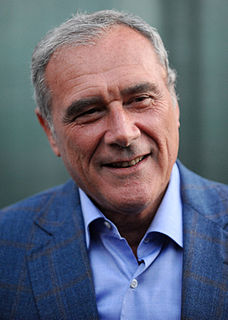
A nationwide popular referendum was held in Italy on 12 June and 13 June 2011, on four questions concerning the repeal of recent laws regarding the privatisation of water services (two questions), a return to the nuclear energy which had been phased out after the 1987 referendum, and criminal procedure, specifically a provision exempting the Prime Minister and the Ministers from appearing in court. The first aim of those campaigning for a yes vote was to ensure that the quorum (50% + 1) of the electorate was reached. [1]

A popular referendum is a type of a referendum that provides a means by which a petition signed by a certain minimum number of registered voters can force a public vote (plebiscite) on an existing statute, constitutional amendment, charter amendment or ordinance, or, in its minimal form, to simply oblige the executive or legislative bodies to consider the subject by submitting it to the order of the day. It is a form of direct democracy.

Italy, officially the Italian Republic, is a country in Southern Europe. Located in the middle of the Mediterranean Sea, Italy shares open land borders with France, Switzerland, Austria, Slovenia and the enclaved microstates San Marino and Vatican City. Italy covers an area of 301,340 km2 (116,350 sq mi) and has a largely temperate seasonal and Mediterranean climate. With around 61 million inhabitants, it is the fourth-most populous EU member state and the most populous country in Southern Europe.
Water privatization is short for private sector participation in the provision of water services and sanitation. Private sector participation in water supply and sanitation is controversial. Proponents of private sector participation argue that it has led to improvements in the efficiency and service quality of utilities. It is argued that it has increased investment and has contributed to expanded access. They cite Manila, Guayaquil in Ecuador, Bucharest, several cities in Colombia and Morocco, as well as Côte d'Ivoire and Senegal as success stories. Critics however, contend that private sector participation led to tariff increases and has turned a public good into a private good. Many believe that the privatization of water is incompatible with ensuring the international human right to water. Aborted privatizations in Cochabamba, Bolivia, and Dar es-Salaam, Tanzania, as well as privately managed water systems in Jakarta and Berlin are highlighted as failures. Water privatization in Buenos Aires, Argentina and in England is cited by both supporters and opponents, each emphasizing different aspects of these cases.
Contents
- Position of main political parties
- Parties with parliamentary representation
- The high offices of the Republic
- Privatization of water services
- Profit on water services
- Nuclear power
- Legal impediment
- Results by Region
- References
The Italians with the right to vote numbered 47,118,352 (22,604,349 men and 24,514,003 women), in addition to 3,300,496 Italians resident abroad. In order for the quorum to be reached, at least 25.209.425 votes for each question had to be cast. [2]
Turnout, while below general election records, was higher than it had been for any referendum since 1995; on 12 June 2011, turnout had reached 11.64% at midday, [3] and 30.32% at 19.00, indicating that the necessary quorum would likely be reached. [4] When polls closed on 13 June 2011, turnout was 56.9%, with clear majorities of 94.6% to 96.1% in favour on all questions [5] (meaning that about 53,8% to 54,7% of electorate approved them). Due to Prime Minister Silvio Berlusconi's implicit invitation to boycott the vote (in the hope that the required quorum would not be met), the results don't accurately represent popular opinion. [6] [ dubious ]

The President of the Council of Ministers of the Italian Republic, commonly referred to in Italy as Presidente del Consiglio, or informally as Premier and known in English as the Prime Minister of Italy, is the head of government of the Italian Republic. The office of Prime Minister is established by Articles 92 through to 96 of the Constitution of Italy. The Prime Minister is appointed by the President of the Republic after each general election and must have the confidence of the Italian Parliament to stay in office.

Silvio Berlusconi is an Italian media tycoon and politician who has served as Prime Minister of Italy in four governments.

















